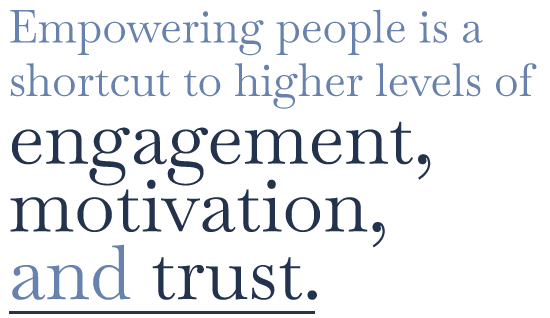
Why empowerment is crucial for your culture

Empowerment is a critical element of building a culture that balances high performance with high care. It is more than just a skill that you learn, it’s an ongoing discipline that requires regular practice. While empowerment carries many business benefits, it’s also a conundrum for a lot of organisations we work with, because it’s heavily tied into deep-rooted beliefs and their resulting behaviours that form the bedrock of corporate culture.
In this blog we will look at what we mean by empowerment, the benefits of empowering your people, and what might be getting in the way. We will also share examples of how you can reframe beliefs and think about empowerment differently, so it becomes a daily discipline.
What is employee empowerment?
Employee empowerment is one of those terms that is open to wide interpretation. At a high level, it’s about giving your people ownership and accountability for deliverables. Stretching your teams in this way is essential for their growth and development, but it also challenges leaders to let go more, trust your people, and not micromanage or do their job for them.
What are the benefits of empowering individuals at work?
The ability to effectively empower individuals is at the heart of high-performing organisations. Four major benefits are:
1. Speed
When you empower people, decisions get made quicker, because they are not going up and down a chain of command and involving more voices than necessary. And when decisions are made swiftly, execution is accelerated.
2. Quality
Decision making by those closest to the issue often improves quality. If you’re escalating decisions or getting too many people involved, you’re moving decisions further away from those with the most knowledge of the problem. This significantly impacts the quality of your decisions, because those removed from the issue simply won’t have the information they need to make a proper judgement.
3. Motivation
Empowering people is a shortcut to higher levels of engagement, motivation, and trust. When people feel they have autonomy and control, they are far more likely to be innovative, creative, and put in greater discretionary effort.
By contrast, nobody likes to be micromanaged. It creates friction, erodes trust, and leads to plummeting engagement and motivation.
4. Value for money
When your leaders are not in the weeds, your organisation is getting value for money from them. They are being paid for their ability to add strategic value, lead their teams, and deliver commercial outcomes. If your leaders are making decisions that could be made by people several levels down from them, then you’re wasting time and money and not getting value for money.
Why are companies struggling with empowerment?
Alongside accountability, empowerment regularly comes up as an issue that we see organisations grappling with. Despite understanding the performance reasons for empowering their people, many are finding it difficult to do.
The core reason is beliefs. Over our 30 plus years of working with thousands of leaders on empowerment, we’ve distilled the most common beliefs into these five:
Established beliefs
1. Control is the best way to get results
People respond better to control than when you give them complete freedom to do things how they want.
2. I need to protect my people
I need to protect my people and put up clear guardrails to stop them from failing. And if it looks like things might go off track, it’s my job to step in quickly and save or support them.
3. The solution will be better if I am involved
The solution will be better if I am involved in developing it, and the quality of the solution is what is most important.
4. It will be quicker to do it myself
It will be quicker to do it myself than to delegate it to someone else.
5. I love the content and topic so I should be involved
I love the content and the topic, so I need to involve myself in all the detail.
At any one time you may have one or more of these beliefs running through your mind. It can depend on the situation and the people you’re dealing with. If these beliefs sound familiar, they are not meant as a criticism. In some cases, they may well be true, and at the very least understandable. However, they are not conducive to empowerment, so we need to reframe them.
What are some creative ways for leaders to empower employees?
Reframe your beliefs
Let’s look at each belief and see how we can think differently to help, not hinder, empowerment:
- Control is the best way to get results. This changes to: Giving people freedom within a framework is the best way to get results in the long-term.
- I need to protect my people. This changes to: People learn best by doing. I need to let my people learn from success and failure.
- The solution will be better if I am involved. This changes to: The solution might be better if I am involved in developing it, but probably not.
- It will be quicker to do it myself than to delegate it to someone else. This changes to: It might be quicker in the short-term, but in the long-term it’s my job to build others’ capability.
- I love the content and the topic, so I need to involve myself in all the detail. This changes to: I love the content and the topic, but it’s not my job to get involved in the detail.
Understand your culture
As empowerment is intrinsically linked to beliefs, it’s vital that as a company you understand what these are and how they show up in your behaviours and culture as limiting levels of empowerment. For example, empowerment may be low because there is a fear of failure, driven by how people who made mistakes were treated in the past. In these situations, leaders will be reluctant to cede control and employees will be less likely to step up, creating a vicious cycle of low performance and high fear.
Understand your leadership mindset, beliefs, and behaviours
As well as looking at your organisational culture, it’s imperative that you as a leader examine your own mindset, beliefs, and behaviours. Empowerment is about daily, even hourly judgements call that you must make, sometimes without full context or facts. What is your default belief setting when it comes to empowerment? Are you reviewing it regularly, or only in exceptional circumstances? It’s much easier to be more empowering when your business is performing well, and it’s harder to resist stepping in when it’s not.
The key point to remember is, empowerment is not a skill you learn, a process you follow, or a model you can apply. It’s an ongoing discipline of making judgements that are impacted by your organisational culture, your own beliefs, and the situations and people you’re faced with. Empowerment is all about balance; As a result, you’re going to feel pulled in different directions at times and make mistakes, and that’s natural. But the better you understand your mindset and beliefs, the better you will understand why, and what you can do differently next time.
While the rational part of our brains understands that empowerment is a positive, the emotional side doesn’t always agree. Layer in organisational culture based on deep rooted beliefs and their evident behaviours, and they can all serve to get in the way of empowering individuals. But if you can start to examine yourself as a leader and be the change you want to see, it is possible to change your culture to unleash empowerment and unlock high performance.
Get in touch to discover why your culture is the way it is, and where you need to focus for change today with our culture change solutions.

Meet the Author


